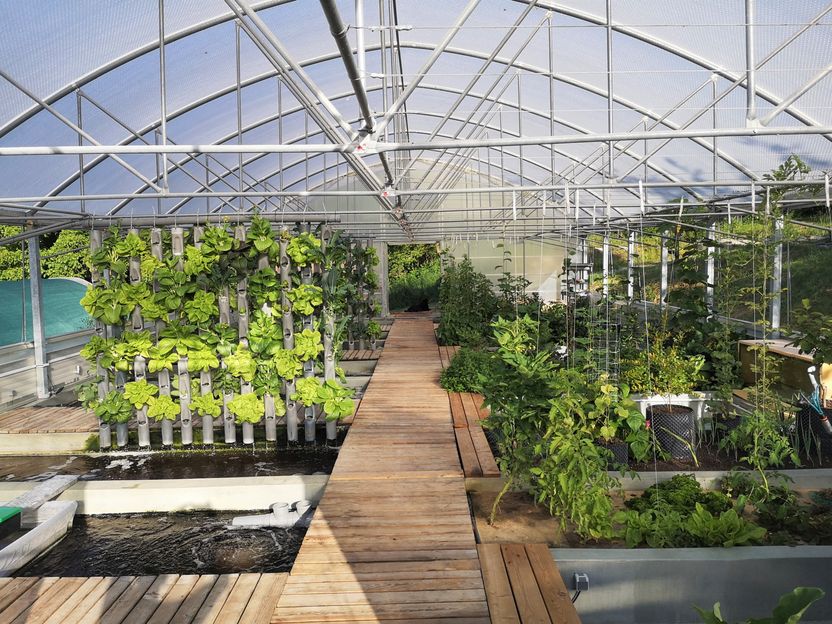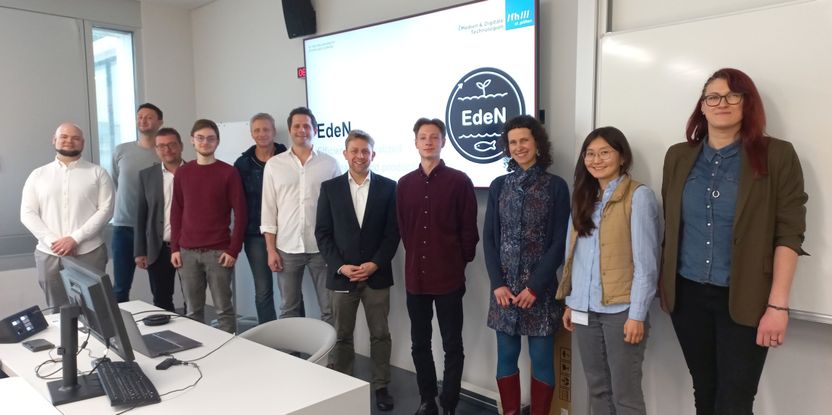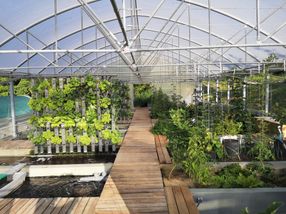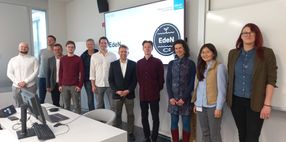Decentralized sustainable food production: research project on circular economy
On the way to a sustainable circular society, efficient, resource-conserving and sustainable food production represents an essential building block for success. A research project at St. Pölten University of Applied Sciences is developing concepts for a circular economy with closed Energy, resource and distribution loops for efficient decentralized sustainable food production.

Aquaponic system
Peter Neudecker / AndersFarm

Project Team
FH St. Pölten / Thomas Felberbauer


The growing world population, increasingly frequent and intense weather extremes, and interrupted global supply chains pose major challenges to traditional food production.
One way to solve these problems is through aquaponic systems. Aquaponics combines aquaculture, the raising of aquatic animals such as fish or crabs in tanks, with hydroponics, the cultivation of crops such as vegetables or herbs in water.
Closed-loop systems
The EdeN (Efficient Decentralized Sustainable Food Production) research project, coordinated by St. Pölten University of Applied Sciences, aims to further develop this approach toward a circular economy. "We want to design an aquaponics system that creates a combination with closed energy, resource and distribution loops in food production," says Thomas Felberbauer, head of the Smart Engineering program at FH St. Pölten and leader of the project.
Partner in the project is the aquaponics producer AndersFarm in Klausen-Leopoldsdorf in the Baden district. The new system is to be evaluated by several aquaponics producers.
Energy efficiency and knowledge management
For the energy consumption of the systems, the project team is working on a technology concept for (partially) self-sufficient operation. This involves making system components more energy efficient, using Internet of Things (IoT) devices to measure and control the system, and making operations more efficient by analyzing the system data collected. Resource cycles will be further closed through new recycling options for residual materials (e.g., fish waste and sediment deposits).
In addition, a knowledge management tool will be used to share information and experiences. On the one hand, this will make the operation more efficient, the yield higher, and on the other hand, future aquaponics operators* will become aware to apply the concept or parts of it to their facility or even other application areas.
Trust in information
"A most critical aspect for sharing information and for product traceability in the food value chain is trustworthy information. Therefore, another outcome of the project will be a concept for a digital food tracking system that measures sustainability and positively influences customers* purchasing decisions," says Felberbauer. The concept will also include proposals for providing information on sustainable and regional food production.
Concepts or parts of concepts developed in the project will be made accessible and transferable to other food producers and demonstrate the advantages and limitations of a network of several aquaponics producers.
The project is being carried out by three scientific partners: St. Pölten University of Applied Sciences, Research Studios Austria and the Austrian Institute of Technology. The IoT service provider BEIA and the plant manufacturer and producer of aquaponics systems AndersFarm are also involved. The Austrian Research Promotion Agency FFG is funding the project.
Note: This article has been translated using a computer system without human intervention. LUMITOS offers these automatic translations to present a wider range of current news. Since this article has been translated with automatic translation, it is possible that it contains errors in vocabulary, syntax or grammar. The original article in German can be found here.
Most read news
Topics
Organizations
Other news from the department science

Get the food & beverage industry in your inbox
By submitting this form you agree that LUMITOS AG will send you the newsletter(s) selected above by email. Your data will not be passed on to third parties. Your data will be stored and processed in accordance with our data protection regulations. LUMITOS may contact you by email for the purpose of advertising or market and opinion surveys. You can revoke your consent at any time without giving reasons to LUMITOS AG, Ernst-Augustin-Str. 2, 12489 Berlin, Germany or by e-mail at revoke@lumitos.com with effect for the future. In addition, each email contains a link to unsubscribe from the corresponding newsletter.



























































